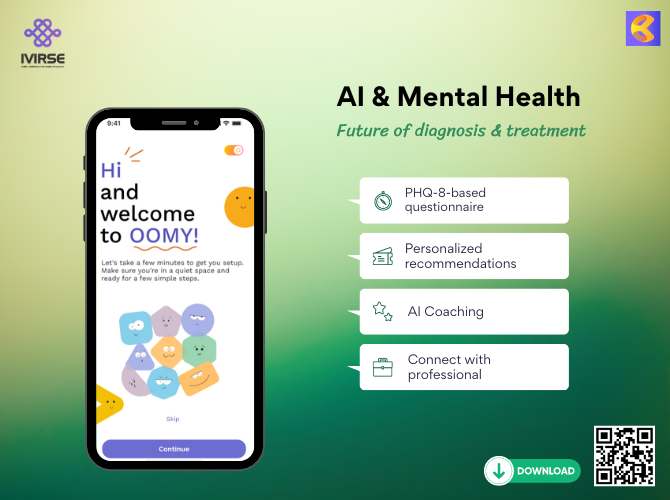AI and Mental Health: The Future of Diagnosis and Treatment
In the rapidly evolving landscape of healthcare, artificial intelligence (AI) stands as a transformative force, particularly in the realm of mental health. With its unparalleled data processing capabilities, AI is poised to redefine the future of diagnosis and treatment for mental health conditions.
The integration of AI in mental health care offers a beacon of hope for personalized medicine. It brings forth tools that can analyze vast amounts of data to identify patterns and predict outcomes, leading to more accurate diagnoses and tailored treatment plans. AI-driven applications can also provide continuous support and monitoring, offering real-time insights into a patient's well-being.

A shining example of AI's application in mental health is the OOMY app, a component of the IVIRSE digihealth ecosystem. OOMY harnesses the power of AI to track users' emotional states through a PHQ-8-based questionnaire, offering personalized recommendations for physical activities and connecting users with mental health professionals. This level of personalized care is unprecedented and marks a significant step forward in making mental health care more accessible and effective.
The promise of AI in mental health extends beyond individual care. It has the potential to alleviate the burden on healthcare systems by automating routine tasks, thus freeing up professionals to focus on more complex cases. Moreover, AI can play a crucial role in addressing the global shortage of mental health professionals by providing scalable solutions that reach wider populations.
However, the journey ahead is not without challenges. Ensuring the ethical use of AI, protecting patient privacy, and maintaining human empathy in care are paramount. As we navigate these challenges, the goal remains clear: to leverage AI to create a future where mental health care is more compassionate, inclusive, and efficient.
The OOMY app is just the beginning. As AI continues to advance, it will undoubtedly unlock new possibilities for mental health care, making it more proactive, predictive, and personalized. The future is bright, and AI is at the forefront, guiding us toward a world where mental health is understood and treated with the sophistication it deserves.
Comment
Latest news
2025 Healthcare Breakthroughs: Trends to Watch!
Most viewed
Mind Matters: Prioritizing Mental Health with OOMY
In today’s fast-paced world, mental health is often overlooked. OOMY is here to change that by putting your well-being first. With its suite of mental health features, this app acts as your digital companion, guiding you through life’s ups and downs.
Unveil Your Inner Voice: OOMY’s Random Tarot Messages
Do you ever feel like the universe is trying to tell you something? OOMY’s Random Tarot feature brings a touch of magic to your everyday life. Whether you’re seeking guidance, inspiration, or just a moment of reflection, these cards offer a doorway to self-discovery.
Walk Your Way to Wellness: Discover Happy Hike on OOMY
Winter is here, and staying active can be a challenge. With OOMY’s Happy Hike feature, walking becomes more than just a physical activity – it’s a holistic experience that connects you to nature and your inner self. Whether you’re strolling through a park, jogging along a trail, or simply taking steps around your neighborhood, every movement matters.
Embrace Winter Wellness with OOMY's Meditation Feature
Winter mornings can be tough. The cold weather tempts us to stay in bed a little longer, leaving us feeling sluggish and uninspired. However, starting your day with morning meditation can change your entire outlook. Let’s explore why and how OOMY’s meditation feature can help you embrace the chill while prioritizing your mental and physical health.